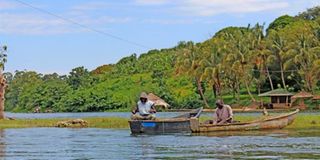Encroachers claim River Nile banks

Encroached. Some of the structures and plantations that have been established on the shores of River Nile in Kayunga District. PHOTO BY DENIS EDEMA
What you need to know:
- The Kayunga District chairperson, Mr Tom Sserwanga, says the district would not have had any problem with the residents if they were observing sustainable use of the river banks.
- The Nile traverses 6,695 kilometres as it journeys from its farthest source at the headwaters of the Kagera Basin to its delta in Egypt.
Kayunga. Due to increasing demand for land, encroachers are now claiming plots of land on the banks of River Nile, Daily Monitor has established.
The encroachment on the river banks has sparked outrage among conservationists and raised fears that such human activity could degrade the environment.
River Nile is the world’s longest river. It serves millions of Ugandans and cuts across 10 countries along the Nile course.
The State Minister for Environment, Dr Mary Kitutu Kimono, says her ministry cannot sit back when River Nile banks and wetlands in the area are being encroached on by merciless developers.
Dr Kimono notes that she has since ordered Kayunga District authorities to evict all the encroachers a.
The Kayunga District Environment officer, Mr Edgar Basaliza, says they are yet to implement the ministerial directive.
He says the most affected section of the river, is in Kangulumira Sub-county, near the Kalagala falls.
Mr Basaliza says residents and foreigners have encroached on the 100 metre nature conservation zone by setting up hotels and gardens yet such areas have to be jealously protected.
This, he says, has greatly degraded the environment as soil and contaminated water is being poured directly into the river. “Eroded soils from construction sites and gardens are, by volume, the greatest pollutants of the river in this area. We are under instructions from the minister to stop such activities,” he says.
Mr Basaliza adds that residents in the area are using the land to grow crops such as maize, rice and yams.
At least 50 encroachers are to be evicted, the environment officer notes.
“Anyone is free to own land near the river, however, they must observe the 100 metre nature conservation zone. Effective October (next month), we are going to start forceful eviction of all people infringing on the river’s conservation zone,” he adds.
Some of the investors who constructed hotels and cottages within the prohibited zone, secured user permits from National Environment Authority (Nema), according to Mr Basaliza.
“If they do contrary to the permits they acquired from Nema, they will also be evicted as well,” Mr Basaliza warns.
Mr Basaliza also noted that they have embarked on a River Nile bank demarcation exercise under which they have erected stone pillars, to show residents the no-go zone areas. He says the exercise started in Kangulumira Sub-county.
The Kayunga District chairperson, Mr Tom Sserwanga, says the district would not have had any problem with the residents if they were observing sustainable use of the river banks.
“The human activities in the nature zone led to a change in the river’s eco-system and as leaders, we have to act swiftly to save the river before it is too late, ”Mr Sserwanga says.
He says they fear that the encroachers, mostly those who have planted crops use dangerous pesticides which kill insects and animals in the river.
A member of the district land board who refused to be named because he is not authorised to speak on behalf of the district says: “As the district land board, we sanctioned some of the developers but we don’t know how other developers came to set up projects there. Their eviction is long overdue.”
Mr Dan Kalibbala, who has a maize and beans garden in the 100 meter nature zone in Kalagala Village, Kangulumira Sub-county , says said he was forced to encroach on the river banks because he had no land.
“They should allow us to continue cultivating crops here because we have nowhere to go. The president should come to our rescue,” an elderly Mr Kalibbala pleads.
Kayunga is among the districts that have land conflicts, something that forced President Museveni three years ago to visit the area twice in a space of one month as he tried to find lasting solutions for the wrangles.
However, his efforts have not yielded any fruit.
About the Nile
The Nile traverses 6,695 kilometres as it journeys from its farthest source at the headwaters of the Kagera Basin to its delta in Egypt. The river is one of the tourist attractions to Uganda and provides a habitat for various plants, wild animals and birds, especially around the Nile Delta, which has been gazetted as a Ramsar site. Ramsar sites are wetlands which have been recognised for their “fundamental ecological functions and their economic, cultural, scientific, and recreational values”, as the 1971 Ramsar Convention states.




